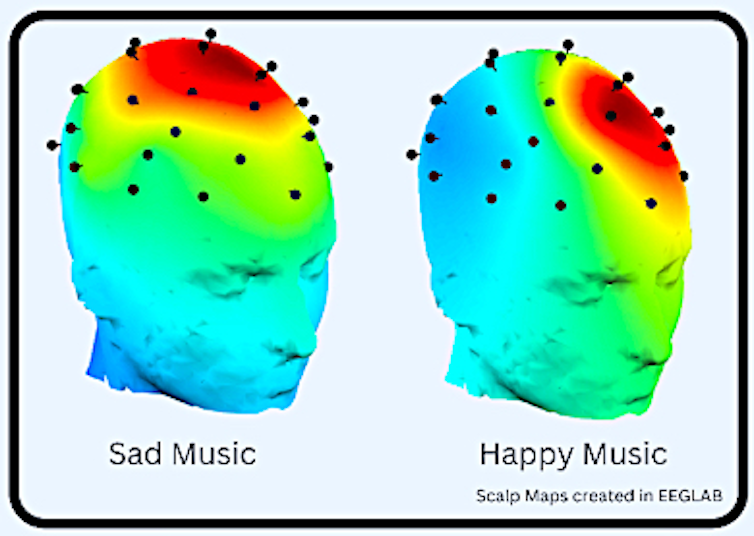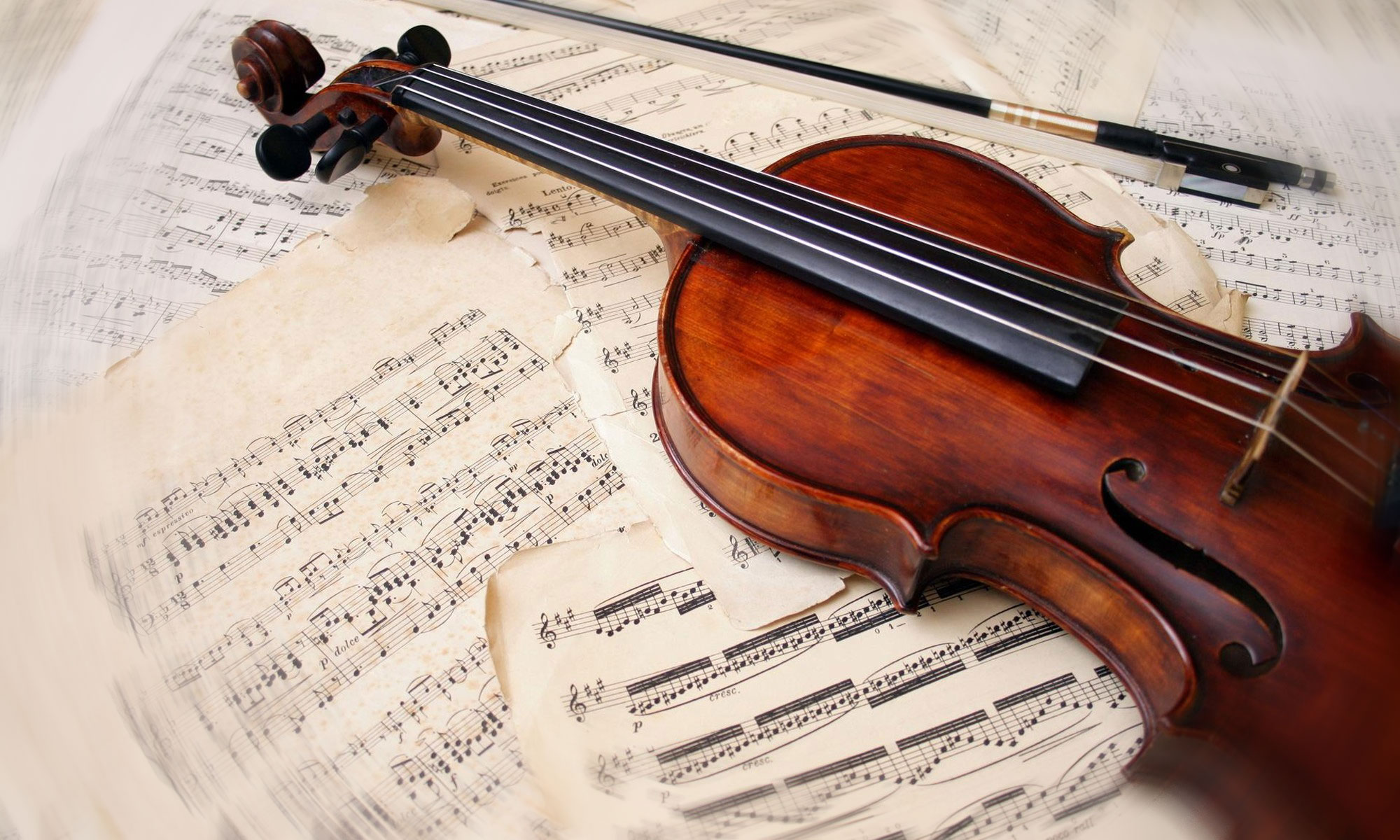How music heals us, even when it’s sad
a neuroscientist leading a new study of musical therapy Professor of Cognitive-Neuroscience , Department of Psychology, Northumbria University, Newcastle
When I hear Shania Twain’s You’re Still The One, it takes me back to when I was 15, playing on my Dad’s PC. I was tidying up the mess after he had tried to [take his own life]. He’d been listening to her album, and I played it as I tidied up. Whenever I hear the song, I’m taken back – the sadness and anger comes flooding back.
There is a renewed fascination with the healing powers of music. This resurgence can primarily be attributed to recent breakthroughs in neuroscientific research, which have substantiated music’s therapeutic properties such as emotional regulation and brain re-engagement. This has led to a growing integration of music therapy with conventional mental health treatments.
Such musical interventions have already been shown to help people with cancer, chronic pain and depression. The debilitating consequences of stress, such as elevated blood pressure and muscle tension, can also be alleviated through the power of music.
As both a longtime music fan and neuroscientist, I believe music has a special status among all the arts in terms of the breadth and depth of its impact on people. One critical aspect is its powers of autobiographical memory retrieval – encouraging often highly personal recollections of past experiences. We can all recount an instance where a tune transports us back in time, rekindling recollections and often imbuing them with a range of powerful emotions.
But enhanced recollection can also occur in dementia patients, for whom the transformative impact of music therapy sometimes opens a floodgate of memories – from cherished childhood experiences and the aromas and tastes of a mother’s kitchen, to lazy summer afternoons spent with family or the atmosphere and energy of a music festival.
One remarkable example is a widely shared video made by the Asociación Música para Despertar, which is thought to feature the Spanish-Cuban ballerina Martha González Saldaña (though there has been some controversy about her identity). The music of Swan Lake by Tchaikovsky appears to reactivate cherished memories and even motor responses in this former prima ballerina, who is moved to rehearse some of her former dance motions on camera.
In our laboratory at Northumbria University, we aim to harness these recent neuroscience advances to deepen our understanding of the intricate connection between music, the brain and mental wellbeing. We want to answer specific questions such as why sad or bittersweet music plays a unique therapeutic role for some people, and which parts of the brain it “touches” compared with happier compositions.
Advanced research tools such as high-density electroencephalogram (EEG) monitors enable us to record how the brain regions “talk” to each other in real-time as someone listens to a song or symphony. These regions are stimulated by different aspects of the music, from its emotional content to its melodic structure, its lyrics to its rhythmic patterns.
Of course, everyone’s response to music is deeply personal, so our research also necessitates getting our study participants to describe how a particular piece of music makes them feel – including its ability to encourage profound introspection and evoke meaningful memories.
Ludwig van Beethoven once proclaimed: “Music is the one incorporeal entrance into the higher world of knowledge which comprehends mankind, but which mankind cannot comprehend.” With the help of neuroscience, we hope to help change that.
A brief history of music therapy
Music’s ancient origins predate aspects of language and rational thinking. Its roots can be traced back to the Paleolithic Era more than 10,000 years ago, when early humans used it for communication and emotional expression. Archaeological finds include ancient bone flutes and percussion instruments made from bones and stones, as well as markings noting the most accoustically resonant place within a cave and even paintings depicting musical gatherings.
Music in the subsequent Neolithic Era went through significant development within permanent settlements across the world. Excavations have revealed various musical instruments including harps and complex percussion instruments, highlighting music’s growing importance in religious ceremonies and social gatherings during this period – alongside the emergence of rudimentary forms of music notation, evident in clay tablets from ancient Mesopotamia in western Asia.

Ancient Greek philosophers Plato and Aristotle both recognised music’s central role in the human experience. Plato outlined the power of music as a pleasurable and healing stimulus, stating: “Music is a moral law. It gives soul to the universe, wings to the mind, flight to the imagination.” More practically, Aristotle suggested that: “Music has the power of forming the character, and should therefore be introduced into the education of the young.”
Throughout history, many cultures have embraced the healing powers of music. Ancient Egyptians incorporated music into their religious ceremonies, considering it a therapeutic force. Native American tribes, such as the Navajo, used music and dance in their healing rituals, relying on drumming and chanting to promote physical and spiritual wellbeing. In traditional Chinese medicine, specific musical tones and rhythms were believed to balance the body’s energy (qi) and enhance health.
During the Middle Ages and the Renaissance, the Christian church was pivotal in popularising “music for the masses”. Congregational hymn singing allowed worshippers to engage in communal music during church services. This shared musical expression was a powerful medium for religious devotion and teaching, bridging the gap for a largely non-literate population to connect with their faith through melody and lyrics. Communal singing is not only a cultural and religious tradition, but it has also been recognised as a therapeutic experience.

In the 18th and 19th centuries, early investigations into the human nervous system paralleled the emergence of music therapy as a field of study. Pioneers such as American physician Benjamin Rush, a signatory of the US Declaration of Independence in 1776, recognised the therapeutic potential of music to improve mental health.
Soon afterwards, figures such as Samuel Mathews (one of Rush’s students) began conducting experiments exploring music’s effects on the nervous system, laying the foundation for modern music therapy. This early work provided the springboard for E. Thayer Gaston, known as the “father of music therapy”, to promote it as a legitimate discipline in the US. These developments inspired similar endeavours in the UK, where Mary Priestley made significant contributions to the development of music therapy as a respected field.
The insights gained from these early explorations have continued to influence psychologists and neuroscientists ever since – including the late, great neurologist and best-selling author Oliver Sacks, who observed that:
Music can lift us out of depression or move us to tears. It is a remedy, a tonic, orange juice for the ear.
The ‘Mozart effect’
Music was my profession, but it was also a special and deeply personal pursuit … Most importantly, it gave me a way to cope with life’s challenges, learning to channel my feelings and express them safely. Music taught me how to take my thoughts, both the pleasant and the painful ones, and turn them into something beautiful.
Studying and understanding all the brain mechanisms involved in listening to music, and its effects, requires more than just neuroscientists. Our diverse team includes music experts such as Dimana Kardzhieva (quoted above), who started playing the piano aged five and went on to study at the National School of Music in Sofia, Bulgaria. Now a cognitive psychologist, her combined understanding of music and cognitive processes helps us delve into the complex mechanisms through which music affects (and soothes) our minds. A neuroscientist alone might fall short in this endeavour.
The starting point of our research was the so-called “Mozart effect” – the suggestion that exposure to intricate musical compositions, especially classical pieces, stimulates brain activity and ultimately enhances cognitive abilities. While there have been subsequent mixed findings as to whether the Mozart effect is real, due to the different methods employed by researchers over the years, this work has nonetheless triggered significant advances in our understanding of music’s effect on the brain.
In the original 1993 study by Frances Rauscher and colleagues, participants experienced enhancement in spatial reasoning ability after just ten minutes of listening to Mozart’s Sonata for Two Pianos in D.
In our 1997 study, which used Beethoven’s second symphony and rock guitarist Steve Vai’s instrumental track For the Love of God, we found similar direct effects in our listeners – as measured both by EEG activity associated with attention levels and the release of the hormone dopamine (the brain’s messenger for feelings of joy, satisfaction and the reinforcement of specific actions). Our research found that classical music in particular enhances attention to how we process the world around us, regardless of one’s musical expertise or preferences.
The beauty of EEG methodology lies in its capacity to track brain processes with millisecond accuracy – allowing us to distinguish unconscious neural responses from conscious ones. When we repeatedly showed simple shapes to a person, we found that classical music sped up their early (pre-300 millisecond) processing of these stimuli. Other music did not have the same effect – and nor did our subjects’ prior knowledge of, or liking for, classical music. For example, both professional rock and classical musicians who took part in our study improved their automatic, unconscious cognitive processes while listening to classical music.
But we also found indirect effects related to arousal. When people immerse themselves in the music they personally enjoy, they experience a dramatic shift in their alertness and mood. This phenomenon shares similarities with the increased cognitive performance often linked to other enjoyable experiences.
In a further study, we explored the particular influence of “program music” – the term for instrumental music that “carries some extramusical meaning”, and which is said to possess a remarkable ability to engage memory, imagination and self-reflection. When our participants listened to Antonio Vivaldi’s Four Seasons, they reported experiencing a vivid representation of the changing seasons through the music – including those who were unfamiliar with these concertos. Our study concluded, for example, that:
Spring – particularly the well-recognised, vibrant, emotive and uplifting first movement – had the ability to enhance mental alertness and brain measures of attention and memory.
What’s going on inside our brain?
Music’s emotional and therapeutic qualities are highly related to the release of neurochemicals. A number of these are associated with happiness, including oxytocin, serotonin and endorphins. However, dopamine is central to the enhancing properties of music.
It triggers the release of dopamine in regions of the brain devoted to reward and pleasure, generating sensations of joy and euphoria akin to the impact of other pleasurable activities such as eating or having sex. But unlike these activities, which have clear value related to survival and reproduction, the evolutionary advantage of music is less obvious.
Its strong social function is acknowledged as the main factor behind music’s development and preservation in human communities. So, this protective quality may explain why it taps into the same neural mechanisms as other pleasurable activities.
The brain’s reward system consists of interconnected regions, with the nucleus accumbens serving as its powerhouse. It is situated deep within the subcortical region, and its location hints at its significant involvement in emotion processing, given its proximity to other key regions related to this.When we engage with music, whether playing or listening, the nucleus accumbens responds to its pleasurable aspects by triggering the release of dopamine. This process, known as the dopamine reward pathway, is critical for experiencing and reinforcing positive emotions such as the feelings of happiness, joy or excitement that music can bring.
We are still learning about the full impact of music on different parts of the brain, as Jonathan Smallwood, professor of psychology at Queen’s University, Ontario, explains:
Music can be complicated to understand from a neuroscience perspective. A piece of music encompasses many domains that are typically studied in isolation – such as auditory function, emotion, language and meaning.
That said, we can see how music’s effect on the brain extends beyond mere pleasure. The amygdala, a region of the brain renowned for its involvement in emotion, generates and regulates emotional responses to music, from the heartwarming nostalgia of a familiar melody to the exhilarating excitement of a crescendoing symphony or the spine-tingling fear of an eerie, haunting tune.
Research has also demonstrated that, when stimulated by music, these regions can encourage us to have autobiographical memories that elicit positive self-reflection that makes us feel better – as we saw in the video of former ballerina Martha González Saldaña.
Our own research points to the hippocampus, crucial for memory formation, as the part of the brain that stores music-related memories and associations. Simultaneously, the prefrontal cortex, responsible for higher cognitive functions, closely collaborates with the hippocampus to retrieve these musical memories and assess their autobiographical significance. During music listening, this interplay between the brain’s memory and emotion centres creates a powerful and unique experience, elevating music to a distinctive and pleasurable stimulus.Visual art, like paintings and sculptures, lacks music’s temporal and multisensory engagement, diminishing its ability to form strong, lasting emotional-memory connections. Art may evoke emotions and memories but often remains rooted in the moment. Music – perhaps uniquely – forms enduring, emotionally charged memories that can be summoned with the replaying of a particular song years later.
Personal perspectives
Music therapy can change people’s lives in profound ways. We have had the privilege of hearing many personal stories and reflections from our study participants, and even our researchers. In some cases, such as the memories of a father’s attempted suicide elicited by Shania Twain’s You’re Still The One, these are profound and deeply personal accounts. They show us the power of music to help regulate emotions, even when the memories it triggers are negative and painful.
In the face of severe physical and emotional challenges, another participant in our study explained how they had felt an unexpected boost to their wellbeing from listening to a favourite track from their past – despite the apparently negative content of the song’s title and lyrics:
Exercise has been crucial for me post-stroke. In the midst of my rehab workout, feeling low and in pain, an old favourite, What Have I Done To Deserve This? by the Pet Shop Boys, gave me an instant boost. It not only lifted my spirits but sent my heart racing with excitement – I could feel the tingles of motivation coursing through my veins.
Music can serve as a cathartic outlet, a source of empowerment, allowing individuals to process and cope with their emotions while supplying solace and release. One participant described how a little-known tune from 1983 serves as a deliberate mood inducer – a tool to boost their wellbeing:
Whenever I’m down or in need of a pick me up, I play Dolce Vita by Ryan Paris. It is like a magic button for generating positive emotions within myself – it always lifts me up in a matter of moments.
As each person has their own tastes and emotional connections with certain types of music, a personalised approach is essential when designing music therapy interventions, to ensure they resonate with individuals deeply. Even personal accounts from our researchers, such as this from Sam Fenwick, have proved fruitful in generating hypotheses for experimental work:
If I had to pick a single song that really strikes a chord, it would be Alpenglow by Nightwish. This song gives me shivers. I can’t help but sing along and every time I do, it brings tears to my eyes. When life is good, it triggers feelings of inner strength and reminds me of nature’s beauty. When I feel low, it instils a sense of longing and loneliness, like I am trying to conquer my problems all alone when I could really use some support.
Stimulated by such observations, our latest investigation compares the effects of sad and happy music on people and their brains, in order to better understand the nature of these different emotional experiences. We have found that sombre melodies can have particular therapeutic effects, offering listeners a special platform for emotional release and meaningful introspection.
Exploring the effects of happy and sad music
Drawing inspiration from studies on emotionally intense cinematic experiences, we recently published a study highlighting the effects of complex musical compositions, particularly Vivaldi’s Four Seasons, on dopamine responses and emotional states. This was designed to help us understand how happy and sad music affects people in different ways.

One major challenge was how to measure our participants’ dopamine levels non-invasively. Traditional functional brain imaging has been a common tool to track dopamine in response to music – for example, positron emission tomography (PET) imaging. However, this involves the injection of a radiotracer into the bloodstream, which attaches to dopamine receptors in the brain. Such a process also has limitations in terms of cost and availability.
In the field of psychology and dopamine research, one alternative, non-invasive approach involves studying how often people blink, and how the rate of blinking varies when different music is played.
Blinking is controlled by the basal ganglia, a brain region that regulates dopamine. Dopamine dysregulation in conditions such as Parkinson’s disease can affect the regular blink rate. Studies have found that individuals with Parkinson’s often exhibit reduced blink rates or increased variability in blink rates, compared with healthy individuals. These findings suggest that blink rate can serve as an indirect proxy indicator of dopamine release or impairment.
While blink rate may not provide the same level of precision as direct neurochemical measurements, it offers a practical and accessible proxy measure that can complement traditional imaging techniques. This alternative approach has shown promise in enhancing our understanding of dopamine’s role in various cognitive and behavioural processes.
Our study revealed that the sombre Winter movement elicited a particularly strong dopamine response, challenging our preconceived notions and shedding light on the interplay between music and emotions. Arguably you could have predicted a heightened response to the familiar and uplifting Spring concerto, but this was not the case.
Our approach extended beyond dopamine measurement to gain a comprehensive understanding of the effects of sad and happy music. We also used EEG network analysis to study how different regions of the brain communicate and synchronise their activity while listening to different music. For instance, regions associated with the appreciation of music, the triggering of positive emotions and the retrieval of rich personal memories may “talk” to each other. It is like watching a symphony of brain activity unfold, as individuals subjectively experienced a diverse range of musical stimuli.
In parallel, self-reports of subjective experiences gave us insights into the personal impact of each piece of music, including the timeframe of thoughts (past, present, or future), their focus (self or others), their form (images or words), and their emotional content. Categorising these thoughts and emotions, and analysing their correlation with brain data, can provide valuable information for future therapeutic interventions.
Our preliminary data reveals that happy music sparks present and future-oriented thoughts, positive emotions, and an outward focus on others. These thoughts were associated with heightened frontal brain activity and reduced posterior brain activity. In contrast, sad tunes caused self-focused reflection on past events, aligning with increased neural activity in brain areas tied to introspection and memory retrieval.
So why does sad music have the power to impact psychological wellbeing? The immersive experience of sombre melodies provides a platform for emotional release and processing. By evoking deep emotions, sad music allows listeners to find solace, introspect, and effectively navigate their emotional states.
This understanding forms the basis for developing future targeted music therapy interventions that cater to people facing difficulties with emotional regulation, rumination and even depression. In other words, even sad music can be a tool for personal growth and reflection.
What music therapy can offer in the future
While not a panacea, music listening offers substantial therapeutic effects, potentially leading to increased adoption of music therapy sessions alongside traditional talk therapy. Integrating technology into music therapy, notably through emerging app-based services, is poised to transform how people access personalised, on-demand therapeutic music interventions, providing a convenient and effective avenue for self-improvement and wellbeing.
And looking even further ahead, artificial intelligence (AI) integration holds the potential to revolutionise music therapy. AI can dynamically adapt therapy interventions based on a person’s evolving emotional responses. Imagine a therapy session that uses AI to select and adjust music in real-time, precisely tailored to the patient’s emotional needs, creating a highly personalised and effective therapeutic experience. These innovations are poised to reshape the field of music therapy, unlocking its full therapeutic potential.

In addition, an emerging technology called neurofeedback has shown promise. Neurofeedback involves observing a person’s EEG in real-time and teaching them how to regulate and improve their neural patterns. Combining this technology with music therapy could enable people to “map” the musical characteristics that are most beneficial for them, and thus understand how best to help themselves.
In each music therapy session, learning occurs while participants get feedback regarding the status of their brain activity. Optimal brain activity associated with wellbeing and also specific musical qualities – such as a piece’s rhythm, tempo or melody – is learned over time. This innovative approach is being developed in our lab and elsewhere.
As with any form of therapy, recognising the limitations and individual differences is paramount. However, there are compelling reasons to believe music therapy can lead to new breakthroughs. Recent strides in research methodologies, driven partly by our lab’s contributions, have significantly deepened our understanding of how music can facilitate healing.
We are beginning to identify two core elements: emotional regulation, and the powerful link to personal autobiographical memories. Our ongoing research is concentrated on unravelling the intricate interactions between these essential elements and the specific brain regions responsible for the observed effects.
Of course, the impact of music therapy extends beyond these new developments in the neurosciences. The sheer pleasure of listening to music, the emotional connection it fosters, and the comfort it provides are qualities that go beyond what can be solely measured by scientific methods. Music deeply influences our basic emotions and experiences, transcending scientific measurement. It speaks to the core of our human experience, offering impacts that cannot easily be defined or documented.
Or, as one of our study participants so perfectly put it:
Music is like that reliable friend who never lets me down. When I’m low, it lifts me up with its sweet melody. In chaos, it calms with a soothing rhythm. It’s not just in my head; it’s a soul-stirring [magic]. Music has no boundaries – one day it will effortlessly pick me up from the bottom, and the next it can enhance every single moment of the activity I’m engaged in.




















